
Johann Baptist Joseph Maximilian Reger, commonly known as Max Reger, was a German composer, pianist, organist, conductor, and academic teacher. He worked as a concert pianist, as a musical director at the Leipzig University Church, as a professor at the Royal Conservatory in Leipzig, and as a music director at the court of Duke Georg II of Saxe-Meiningen.

Wilhelm Reinhard Berger was a German composer, pianist and conductor.
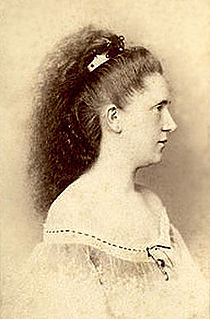
Ingeborg Bronsart von Schellendorf was a Finnish-German composer.
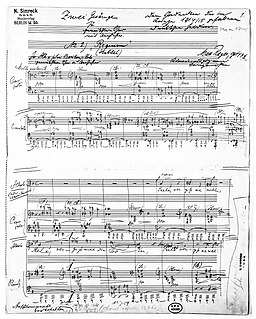
Max Reger's 1915 Requiem, Op. 144b, is a late Romantic setting of Friedrich Hebbel's poem "Requiem" for alto or baritone solo, chorus and orchestra. It is Reger's last completed work for chorus and orchestra, dedicated in the autograph as Dem Andenken der im Kriege 1914/15 gefallenen deutschen Helden.

Der 100. Psalm, Op. 106, is a composition in four movements by Max Reger in D major for mixed choir and orchestra, a late Romantic setting of Psalm 100. Reger began composing the work in 1908 for the 350th anniversary of Jena University. The occasion was celebrated that year with the premiere of Part I, conducted by Fritz Stein on 31 July. Reger completed the composition in 1909. It was published that year and premiered simultaneously on 23 February 1910 in Chemnitz, conducted by the composer, and in Breslau, conducted by Georg Dohrn.

Three chorale fantasias, Op. 52, are chorale fantasias for organ by Max Reger. He composed the fantasias on three chorales in September 1900: Phantasie über den Choral "Alle Menschen müssen sterben", Phantasie über den Choral "Wachet auf, ruft uns die Stimme" and Phantasie über den Choral "Halleluja! Gott zu loben bleibe meine Seelenfreud". They were all first performed individually by Reger's friend Karl Straube, and were first published by Breitkopf & Härtel.

Vier Tondichtungen nach A. Böcklin, Op. 128, is a composition in four parts for orchestra by Max Reger, based on four paintings by Arnold Böcklin, including Die Toteninsel. He composed them in Meiningen in 1913.

Drei Chöre, Op. 6, is a set of three compositions for mixed choir and piano by Max Reger, composed before 2 August 1892 in Wiesbaden. The texts are poems by three poets:
- Trost
- Zur Nacht
- Abendbild

Zwei Choralphantasien, Op. 40, are fantasias for organ by Max Reger. He composed the fantasias in 1899 on two chorales: "Wie schön leucht't uns der Morgenstern" and "Straf mich nicht in deinem Zorn" They were published by Musikverlag Josef Aibl in Munich in May 1900.

Sechs Lieder, Op. 35, is a set of six Lieder for medium voice and piano by Max Reger. He composed the first five of them in Berchtesgaden in June and July 1899, and the last one in Weiden in August that year. Dedicated to different people, they were published by Jos. Aibl Verlag in Munich the same year.

Zwölf Stücke, Op. 65, is a group of twelve pieces for organ by Max Reger, composed in Munich in 1902. They were published by C. F. Peters in Leipzig in August of that year, in two books (Heft) of six pieces each.

Zwölf Stücke, Op. 80, is a group of twelve pieces for organ by Max Reger. He composed them in Munich in 1902 and 1904. They were published by C. F. Peters in Leipzig in September 1904.

Ein' feste Burg ist unser Gott, Op. 27, is a chorale fantasia for organ by Max Reger. He composed it in 1898 on Luther's hymn "Ein feste Burg ist unser Gott". The full title is Phantasie über den Choral "Ein' feste Burg ist unser Gott".

The Cello Sonata in F minor, Op. 5, was composed by Max Reger in 1892 in Wiesbaden. He dedicated it to the cellist Oskar Brückner who performed it first, with the composer as the pianist, in Wiesbaden on 17 October 1893. It was published by Augener & Co., London, in September 1893.
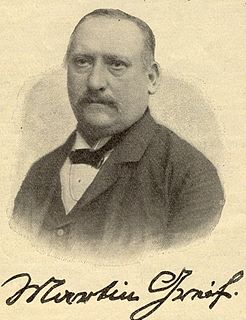
Martin Greif, born Friedrich Hermann Frey was a German freelance writer of poems and of dramas which were performed at the Burgtheater in Vienna and the Bavarian Court Theatre in Munich. His songs inspired compositions by Max Reger and Alban Berg, among others.

"An die Hoffnung", Op. 124, is a Lied for alto or mezzo-soprano and orchestra by Max Reger, setting a poem by Friedrich Hölderlin. He composed it in Meiningen in 1912 and dedicated it to Anna Erler-Schnaudt, the singer of the first performance. It was published by Edition Peters the same year.
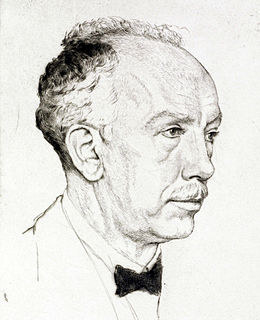
Sechs Lieder, Op. 68, is a collection of six Lieder by Richard Strauss. He composed them, setting poems by Clemens Brentano, in 1918 for soprano and piano, and orchestrated one in 1933 and five in 1940. The piano version was first published by Adolph Fürstner in Berlin in 1919. They are also known as Brentano Lieder.

Sechs Lieder, Op. 59, is a collection of six part songs for four voices a cappella by Felix Mendelssohn. He composed the songs between 1837 and 1843, setting six poems in German. They are subtitled "Im Freien zu singen", and focus on nature. They were published after his death as part of his complete works. One of the songs, "O Täler weit, o Höhen" became so popular that it is also regarded as Volkslied.
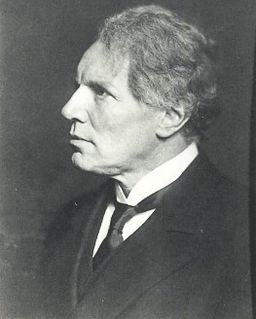
Ludwig Wüllner was a German concert and operatic tenor, as well as an actor and narrator. He is regarded as one of the most versatile and important stage performers of his time.














